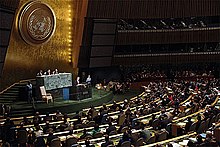United Nations General Assembly
![]()
This article or section needs revision. More details should be given on the discussion page. Please help improve it, and then remove this tag.
The United Nations General Assembly (UNGA) is the plenary assembly of the member states of the United Nations. It meets annually in September at UN Headquarters in New York City. Each member state may be represented by up to five persons at a session. The General Assembly first met on 10 January 1946 in London's Westminster Central Hall, with delegates from 51 countries.
The General Assembly examines and approves the budget of the United Nations (Art. 17 I UN Charter). Its other tasks include deliberating and adopting recommendatory resolutions. The General Assembly may deal with practically any question of international importance as long as it is not dealt with simultaneously by the UN Security Council (Art. 12 para. 1 UN Charter).
In contrast to UN Security Council resolutions, those of the UN General Assembly are not binding under international law, but can carry political weight in that they represent a decision by a majority of member states. This does not mean, however, that their decisions must remain without effect under international law: UNGA resolutions can, under certain conditions, contribute to the formation of binding customary international law. In addition, UNGA resolutions concerning matters internal to the organization, such as administrative or budgetary matters (budget), are binding on the Secretariat.
To facilitate the work, the General Assembly has set up committees on various topics, which in turn can convene working groups.

A representative of a UN member state delivers a speech to the General Assembly
.jpg)
Prime Minister of Malaysia Mahathir bin Mohamad addressing the United Nations General Assembly in New York on 25 September 2003.
Main Committees
The main committees of the General Assembly are in detail:
- The Committee on Disarmament and International Security (Main Committee 1)
- The Economic and Financial Committee (Main Committee 2)
- The Committee on Social, Humanitarian and Cultural Affairs (Main Committee 3)
- The Committee on Special Political Questions and Decolonisation (Main Committee 4)
- The Administrative and Budgetary Committee (Main Committee 5)
- The Legal Committee (Main Committee 6)
Vote
Each member state has one vote in the General Assembly (Art. 18 UN Charter), which means that the vote of each state is worth the same. Criteria such as size, population or economic power are irrelevant. Decisions on important issues are taken by a majority of two-thirds of the members present and voting. These include, for example:
- Recommendations concerning the maintenance of international peace and security
- the election of non-permanent members of the Security Council and of the other principal organs
- the admission of new members
- the suspension of rights of a State from membership
- the exclusion of members
- Budget issues
In other matters, a resolution shall be adopted by a simple majority.
During voting, votes in favour, votes against, abstentions and non-votes (mostly due to absence) are recorded. In some cases, subsequent entries are also recorded.
Search within the encyclopedia